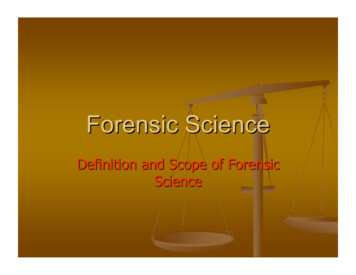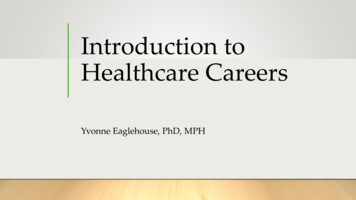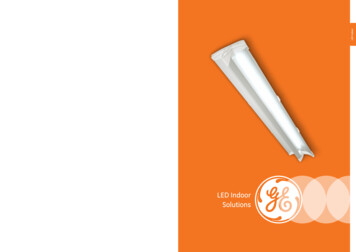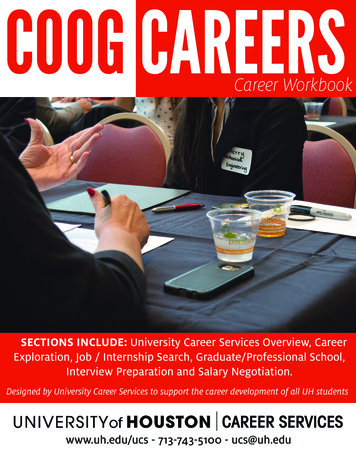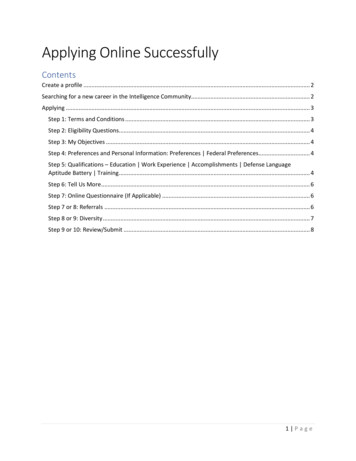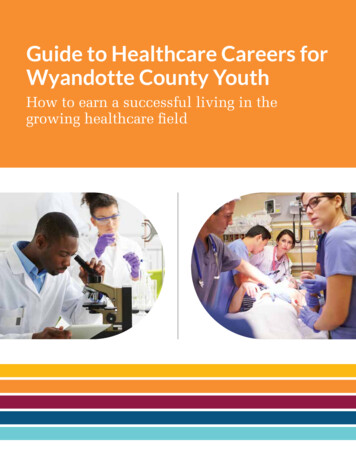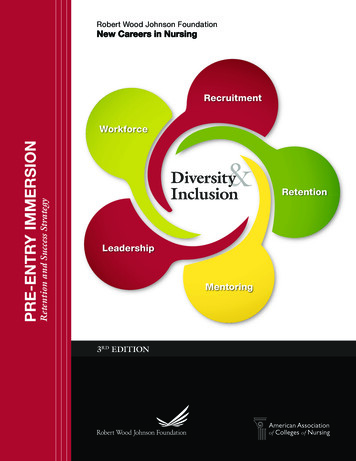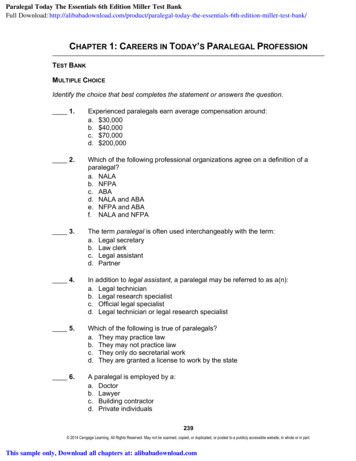
Transcription
Science CareersClassified AdvertisingFor full advertising details, go toScienceCareers.org and click For Employers,or call one of our representatives.UNITED STATES & CANADAE-mail: advertise@sciencecareers.orgFax: 202-289-6742Daryl AndersonUS Sales ManagerPhone: 202-326-6543Tina BurksMidwest/CanadaPhone: 202-326-6577Alexis FlemingEast CoastPhone: 202-326-6578Nicholas HintibidzeWest Coast/South CentralPhone: 202-326-6533Online Job Posting QuestionsPhone: 202-326-6577EUROPE & INTERNATIONALE-mail: ads@science-int.co.ukFax: 44 (0) 1223 326532Tracy HolmesAssociate Director, Science CareersPhone: 44 (0) 1223 326525Alex PalmerPhone: 44 (0) 1223 326527Dan PenningtonPhone: 44 (0) 1223 326517Susanne Kharraz TavakolPhone: 44 (0) 1223 326529Lisa PattersonPhone: 44 (0) 1223 326528To subscribe to Science:In US/Canada call202-326-6417 or 1-800-731-4939.In the rest of the world call 44 (0) 1223 326515.Science makes every effort to screen its adsfor offensive and/or discriminatory languagein accordance with US and non-US law. Sincewe are an international journal, you may seeads from non-US countries that request applications from specific demographic groups.Since US law does not apply to other countrieswe try to accommodate recruiting practicesof other countries. However, we encourageour readers to alert us to any ads that theyfeel are discriminatory or offensive.POSITIONS OPENPOSITIONS OPENFACULTY POSITIONSYSTEMS MICROBIOLOGISTThe University of Rochester School of Medicine andDentistry and the Department of Microbiology and Immunology are expanding their existing scientific andresearch program in microbiology. The Departmentwishes to recruit a tenure-track Systems Microbiologistat the ASSISTANT, ASSOCIATE, or FULL PROFESSOR level. Preference will be given to candidatesworking in the field of bacteriology. Commensuratewith proposed rank, candidates will be expected to develop, or to already have, an independent research program that will complement existing programs. Thesuccessful candidate will be joining a highly interactivefaculty (website: http://www.urmc.rochester.edu/smd/mbi/) housed in a new research building withstate-of-the-art core facilities (website: ties.cfm),and will participate in the University s new program inGenomics and Systems Biology (website: tion/isp/genomics.cfm). The University is ranked among thenation s top 10 nonprofit workplaces for life scientists,according to The Scientist magazine s annual assessmentof BBest Places to Work[ (website: tion/strategicplan-news/10-best.cfm). An attractive salary, competitive startup package, and new laboratory space adjacentto the other microbiologists in the Department areavailable. Interested individuals should submit a letterof application, curriculum vitae, a statement of researchinterests and goals, and the names, addresses, and telephone numbers of three references. These materialsshould be sent to:Steve Dewhurst, Ph.D.Professor and Chair, Department of Microbiologyand Immunologyc/o Brenda KnorrUniversity of Rochester Medical Center601 Elmwood Avenue, Box 672Rochester, NY 14642-0672 USATelephone: 585-275-3402; fax: 585-473-9573E-mail: bknr@mail.rochester.eduThe University of Rochester has a strong commitment to principles of diversity and, in that spirit, actively encourages applicationsfrom groups underrepresented in higher education.RESEARCH FACULTY POSITIONThe University of RochesterSchool of Medicine and DentistryDivision of Endocrinology and MetabolismThe Division of Endocrinology and Metabolism atthe University of Rochester School of Medicine is seeking new Research Faculty members of all ranks. Candidates must have an M.D. or Ph.D. and should beperforming endocrine-related basic or translational research. The Division is under new leadership and isseeking to rapidly expand its academic programs. Thus,the University of Rochester offers an exciting opportunity for research scientists interested in endocrinology.Please electronically transmit curriculum vitae and coverletter to: Stephen Hammes, Chief, Division of Endocrinology and Metabolism, University of RochesterSchool of Medicine, e-mail: stephen hammes@urmc.rochester.edu.The University of Rochester has a strong commitment to principles of diversity and, in that spirit, actively encourages applicationsfrom groups underrepresented in higher education.POSTDOCTORAL POSITION. Open immediately in the Microbiology and Cell Science Department, University of Florida, for a qualified U.S. citizenor permanent resident with a demonstrated interest inprokaryotic molecular genetics and regulation. The position is funded by an NIH Recovery Act Supplementfor BMechanism of CsrA-Mediated Global Control,[to investigate a global regulatory system involving anRNA binding protein (CsrA) and noncoding regulatory RNAs. Applicants should electronically submit theircurriculum vitae and three references to: Tony Romeo,Ph.D., e-mail: tromeo@ufl.edu.CHEMICAL BIOLOGYThe College of Charleston Department of Chemistryand Biochemistry, located in historic downtown Charleston, South Carolina, invites applications for a tenuretrack position as an ASSISTANT PROFESSOR inchemical biology to begin August 2010. Applicantsmust possess a terminal degree. Postdoctoral experienceis highly desired. Teaching responsibilities will inludeboth lecture and laboratory. The successful candidatemust initiate and sustain a research program that includes undergraduates. Review of applications will beginOctober 1, 2009, and continue until the position isfilled. For more information visit website: http://www.cofc.edu/Èchem. Questions may be directed to e-mail:heldrichr@cofc.edu; telephone: 843-953-5515.www.sciencecareers.org SCIENCEENDOWED PROFESSORSHIPIN NEUROPHYSICS OR BIOPHYSICSTrinity University, San Antonio, TexasThe Department of Physics and Astronomy at TrinityUniversity invites applications for the Williams Endowed Professorship in Neurophysics or Biophysics, tobegin in August 2010. This position, along with threerecently filled positions (two senior and one junior), willenrich our rapidly growing undergraduate major in neuroscience at Trinity, which was established with supportfrom the Howard Hughes Medical Institute mDevelopment/neuroscience major.html). The Neuroscience Program is interdepartmental with six facultyfrom biology, psychology, and chemistry, and with thisposition will now include physics. It is a vibrant Programwith research interests ranging from behavioral psychology to reproductive behavior to the neurochemistryof neurodegenerative disease. Requirements include aPh.D. in physics or neuroscience with a strong physicscomponent, a current tenured position at the rank of Associate Professor or higher, and a distinguished recordof teaching and research. Preference will be given tocandidates who can enhance connections with the Psychology and/or Biology Departments and can contribute to a degree program in neuroscience, and who willestablish a research program that includes participationby students. Candidates in experimental, theoretical, orcomputational research are all encouraged to apply.Please submit curriculum vitae and detailed statementsof experience and interests in teaching and research to:Chair of the Search Committee, Endowed Professorship in Neurophysics or Biophysics, Departmentof Physics and Astronomy, Trinity University, OneTrinity Place, San Antonio, TX 78212. Applicantsmust also arrange for three letters of reference to be sentto the Search Committee. Review of complete application files, with letters, will begin on December 1, 2009.The Department of Physics and Astronomy (website:http://www.trinity.edu/physics) has six faculty andattracts outstanding students. Active research areas includeastrophysics/cosmology, atmospheric physics, dynamicsand pattern formation in soft matter and biologicalsystems, nanomaterials/plasmonics, and gravitational wavedetection. Trinity University is an Equal Opportunity Employer. We strongly encourage applications from qualified womenand minority candidates.The Department of Pathology and Cell Biology atColumbia University seeks highly qualified individualsfor faculty positions in surgical pathology, anatomicpathology, and research. Appointments can be at theASSISTANT, ASSOCIATE, PROFESSOR, or ASSOCIATE RESEARCH SCIENTIST level depending on experience and qualifications. Clinical positionsrequire Board certification and a license in New YorkState prior to the start of service. Research positionsrequire record of publication in leading journals anda statement of research directions. To apply online goto website: al?quickFind051975.Columbia University takes Affirmative Action toward EqualEmployment Opportunity. Women and minorities are encouragedto apply.VOL 325 14 AUGUST 2009887online @sciencecareers.orgRelease The Power of Science
online INFECTIOUS DISEASEUROLOGYChanging tomorrowThe purpose of tomorrow.Here at Astellas, we are working hard every day to makepeople’s lives better. We hold each other to a very highstandard, and we have an intense awareness of purpose.I’m proud to be a part of an organization that knowswhat it wants to do, and works hard to make it happen.I’m a Senior Project Coordinator for Biopharm Science andI’m helping Astellas change tomorrow.Together, we nologyNeuroscienceBiotechnologyPharmaceuticsCancer Researchand so much more.www.ttuhsc.edu/gsbs/ - 800-528-5391graduate.school@ttuhsc.eduMS PhD MD/PhDcareers and grad programs for b.s./m.s. scientistsNancy CrorkinSenior Project Coordinator, Biopharm SciencePhD Program inBiochemistry andMolecular BiologyOur program, which benefits from theunique environment of the BloombergSchool of Public Health, offers training in the following areas: Biochemistry Molecular and Cellular Biology Reproductive Biology Structural BiologyThis program provides full funding forall students, including a competitivestipend and benefits.Please visit our website for moreinformation at http://jhsph.edu/dept/BMB/ or contact Sharon Warner atswarner@jhsph.edu.
FOCUS ON CAREERSAAAS/Science Business Office FeatureBS/MS: CHOOSING THE RIGHT GRAD PROGRAMFinding a Partner for Your Ph.D.The selection of a doctoral program: it’s not quite marriage, but it’s a long-term commitmentthat could turn into a lifetime relationship, perhaps impacting—positively or negatively—the rest of your research career. By Emma HittMost people graduating with their Ph.D. in science will say that graduateschool represents a very different scenario than simply attending classesand passing exams, as during their undergraduate studies. A doctoraldegree can sometimes take six or more years—and there’s no guaranteethat the joyous day ending with a diploma in hand will even materialize.Unlike the undergraduate experience, earning a doctoral degree is largely dependent onone’s efforts to conduct research, write journal articles, and most important, complete adissertation. Success in these areas arises at least in part from picking a graduate schooland a program that represents a suitable match, selecting the right adviser, and perhapsexperiencing a little luck with your research projects. On what basis, therefore, should agraduate school be selected? And how, exactly, can one sift through the myriad of potentialmatches to make this momentous decision?CREDIT (FROM TOP): STEVE GLADFELTER, VISUAL ART SERVICE, STANFORD UNIVERSITY; ISTOCKPHOTO.COM/DSTEPHENSThe Right MatchAccording to data from the Ph.D. Completion Project conducted by the Council of GraduateSchools (CGS)—the main organization representing graduate students in the UnitedStates—fewer than 60 percent of students entering graduate school in the scienceswill complete their doctoral degree within a 10-year time frame. About one in fivepeople in the life sciences drop out entirely during the program. And by about yearsix, according to the project data, only about 42 percent of doctoral students inthe life sciences will have completed their degree, 34 percent will still be slavingaway at it, and 24 percent will have thrown in the towel. For the math and physicalsciences, only about 39 percent complete their degree by year six, 27 percent arestill going, and 34 percent have dropped out. These data underscore the need topick a graduate school wisely.“Completing a doctoral degree has much more to do with the right match of agraduate program to a given student than it does with personality characteristicsor even the academic preparation of an individual student,” says Debra W. Stewart,president of the CGS. An excellent, motivated student may fail to succeed in aprogram that is not an appropriate match; whereas a less academically preparedstudent may blossom in the right environment.One important aspect of the match has to do with academic climate, Stewart says.“Some students might do well in a kind of dog-eat-dog, highly competitive environment;other students would be crushed by that, and would do much better in a much more laidback, laissez faire–type environment,” she says. “You have to know yourself, and you haveto really know the kind of climate you need to ensure that you grow and develop in yourintellectual and professional life as a result of this program.”each quarter allowsQuality Countsa decision.“We increasingly encourage students to gain information, including about placement ofgraduates of the program, how long it typically takes a student to get a degree, and whatpercentage of the students who begin programs actually complete them,” says Stewart.“All of those are dimensions of quality,” she says.Above all, “the most important criteria for selecting a graduate school should be thequality and commitment of the faculty,” says G. Steven Martin, department chair ofMolecular and Cell Biology, at the University of California, Berkeley. Factors to considerwhen evaluating the quality of the faculty include the number, impact, and significanceof scientific publications, in addition to any honors and recognition received, he says. If aPubMed search on a potential academic adviser pulls up only a few publications in recentyears, or if the publications are all in specialized or archival journals, then this may indicatethat the faculty member has a limited interest in research, and perhaps spends continued »www.sciencecareers.org/businessfeaturesPatricia Burchat“A new lab rotationstudents to learn moreabout the researchpursued by the groupand gives a studentthe opportunity totest the ‘culture’ in thegroup before making”UPCOMING FEATURESPostdoc Survey — August 28Faculty 2: Funding Your Future — September 11Focus on Europe — September 25889
FOCUS ON CAREERSAAAS/Science Business Office FeatureBS/MS: FINDING THE RIGHT GRAD PROGRAMin the group before making a decision,” Burchat says. “The rotationsystem also allows the adviser to interact with the student beforemaking the very significant commitment to mentor and supportthe student for her/his graduate career, and helps promote bettermatches between student advisees and faculty advisers and researchareas,” she adds.“Increasingly, many programs recruitstudents to visit the school maybeafter acceptance, but before thestudent makes a decision, to tryensure that it is the right match.”—Debra W. StewartFinancially and Geographically SpeakingAn Interest in InterestsA key question with respect to match, also, is whether the facultyavailable at an institution meshes with a student’s particularresearch interests, Stewart says. “You can have a fine programacross the board, but it might not have a sufficient number of facultymembers in a specialty area desired by the student.” Even withina specific scientific discipline, for example biology, the range ofstudy—genetics, cell biology, botany, entomology, marine biology,zoology to name a few— can be very diverse. The same holds truefor the physical sciences. Making sure a doctoral program canaccommodate a student’s specific interest is an important first stepin the selection process.For students with a clearly defined idea of what they want to study,perhaps the best resource will be a professor at an undergraduateinstitution who currently serves as an adviser or mentor. A studentwho has worked with a professor in a lab during undergraduatestudies and wants more of the same may ask for a recommendedprofessor or program of related research at another institution.However, not all students have a clearly defined path when they goto graduate school, so one strategy for a successful match is to picka larger school, with many different types of programs and qualifiedfaculty. “The interests of students often develop and changebetween undergraduate and graduate studies because the studentis exposed to many more research options as a first-year graduatestudent than they likely were even aware of as an undergraduate,”says Patricia Burchat, department chair, Physics, Stanford University.“Therefore, I think students should look for schools with a variety ofprograms of interest, rather than focusing on one particular researcharea, laboratory, or adviser,” she says. The more opportunitiesthat are available, the better the chance will be of selecting a labthat will match your interests and for completing the venerabledegree program.Some graduate science programs offer the opportunity to performresearch rotations in various laboratories and with differentprofessors. Rotations are a way to make sure that a lab is a goodmatch, both personally and professionally, before settling in. Thisis especially important since it is often difficult to switch labs lateron, and doing so may add months or years to a degree program. ThePh.D. programs in physics and applied physics at Stanford give firstyear graduate students the opportunity to rotate through differentresearch groups during their first year. “A new lab rotation eachquarter allows students to learn more about the research pursuedby the group and gives a student the opportunity to test the ‘culture’890Featured ParticipantsChronicle of Higher Educationwww.chronicle.comCouncil of Graduate ww.phds.orgQuintessential Careerswww.quintcareers.comStanford Universitywww.stanford.eduUniversity of California, sfeaturesCREDIT: COUNCIL OF GRADUATE SCHOOLSmore time as an administrator or in teaching activities. Likewise, ifthe faculty member’s institutional or lab website does not clearlydescribe the lab’s achievements or convey a sense of excitementabout the research or future directions, then this, too, may indicatethat selecting a more active lab might provide a more productive andsatisfying graduate school experience.Other aspects to consider include more practical issues, such asfinancial support, that may or may not be available to the student.One question to ask is, what is the average number of years it takesstudents to complete the program? since each year spent in graduateschool represents tens of thousands of dollars of foregone income.In the sciences, many Ph.D. programs offer a tuition waiver and astipend in return for committing to an intensive schedule working ina laboratory and passing up other employment. Graduate programswill typically state this information on their website. Some packagedeals are better than others. The cost of living of a specific areamust also be considered, as should personal preferences: a studentattending a college that is nestled in the countryside is likely to missthe big city after five or six years, even though it’s “just college” andthey haven’t “settled down” yet.Other questions about the design of the program include thecoursework required—does it c
percentage of the students who begin programs actually complete them,” says Stewart. “All ofthoseare dimensions of quality,”she says. Above all, “the most important criteria for selecting a graduate school should be the quality and commitment of


